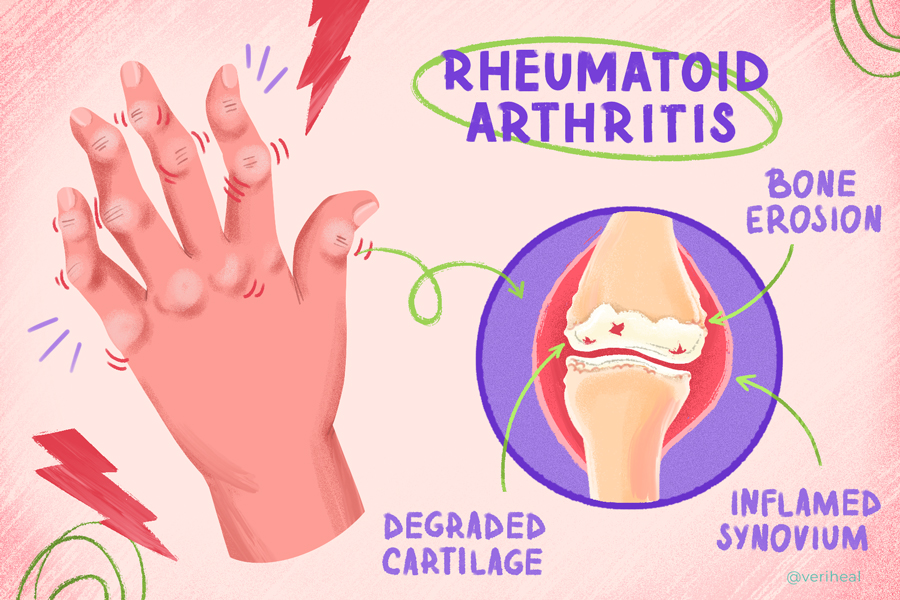Patients Turn to Medical Marijuana for Rheumatoid Arthritis

- Is CBD Good for RA?
- Using Medical Cannabis for Rheumatoid Arthritis
- MMJ and RA: Considerations
- What Makes Rheumatoid Arthritis Different
- Rheumatoid Arthritis and Medical Cannabis: The Research
Rheumatoid arthritis (RA) is a very painful condition that occurs in several joints such as the hips, knees, and shoulders of those who have it. It is considered an autoimmune disease because there is not typically an injury or source of damage to the joint other than the body thinking the healthy joint tissue is a foreign invader, where it then attacks the healthy tissue. This causes inflammation and chronic pain for those who have RA. Unfortunately, there is no cure for rheumatoid arthritis, but there are several prescription medications such as biologics and DMARDs that can help a patient manage the inflammation and help prevent long-term complications. However, with any medications, including medical cannabis, there are pros and cons.
RA is considered one of the leading types of arthritis and a large reason why many patients end up seeking medical cannabis to help relieve pain and inflammation (20)(12). Cannabis consists of several cannabinoids, or chemical compounds, that work together to target the endocannabinoid system in the body. The endocannabinoid system consists of self-made and fatty-based neurotransmitters throughout the body. These neurotransmitters are responsible for maintaining proper body temperature (homeostasis), as well as modulating the immune system’s attack on healthy tissue (22).
When the cannabinoids from cannabis enter the body, including Δ9-tetrahydrocannabinol (THC) and cannabidiol (CBD), they activate cannabinoid protein receptors CB1 and CB2, which are found around the body. When these receptors are activated, the cannabis works through a variety of biological processes to alter the body’s perception of pain as well as slowing the immune system’s attack on healthy tissues by causing the immune cells to slow down and die instead of damaging the body (22).
Keep in mind that there is yet insufficient evidence to justify the replacement of any antirheumatic drugs with cannabinoids (28). Cannabis could still be a useful component of an overall treatment plan between you and your provider. It is important that you keep seeing them for advice and management of rheumatologic conditions that could result in long-term damage and even disability if not treated timely and properly.
For more information on how the endocannabinoid system works, please see our page on endocannabinoids here. In addition, check out our main arthritis page for some of the cellular mechanisms that help treat arthritis.
Is CBD Good for RA?
CBD is a potent mediator of inflammation and chronic pain in general but has not yet been formally studied for use in RA patients aside from one clinical study involving Sativex (9)(3). It is also a good option for patients who are concerned about the psychoactive effects of cannabis. As noted by Dr. Ethan Russo, CBD has been found to counteract the psychoactive effects of THC when CBD and THC are combined (23). CBD has also been shown to help improve sleep and pain of RA patients in a small clinical study using Sativex (3).
A 2016 study focusing on rat models of arthritis showed very promising results. The CBD-only gel was shown to reduce pain, joint swelling, and proinflammatory markers in the rats who received it (29). This suggests that there should be ongoing research concerning CBD and its potential ability to reduce inflammation in the joints of patients with RA.
A 2020 study published in Cell Death & Disease details out some very promising mechanisms of how CBD interacts with the body. This research shows that CBD has the ability to increase the calcium levels within cells (which causes cell death), as well as reducing cell viability and the production of rheumatoid arthritis synovial fibroblasts (RASF) (16). This is important because it shows that CBD by itself has the ability to be used as an anti-arthritic with its ability to slow the autoimmune attack against synovial, or joint, tissues in rheumatoid arthritis. This study took place using samples from 40 RA patients whose synovial, or joint fluid was removed and tested after various medications were administered. Patients with long-standing RA underwent elective knee replacement while on medication, and it was also found that CBD had boosted cellular effects on the samples when used under a pro-inflammatory state.
Using Medical Cannabis for Rheumatoid Arthritis
It is typically recommended for patients who are new to medical cannabis to start with smaller doses and work their way up to larger doses. You do not necessarily need to feel the psychoactive “high” to benefit from cannabis’ ability to treat pain and discomfort.
Many patients with RA see a reduction of inflammation and pain when using cannabis that has a higher portion of CBD to THC in it. Some ratios of CBD to THC that may be helpful include 20:1, 2:1, or 1:1 products (1). Topicals and transdermal patches are safe options to target pain in a particular joint of the body without any intoxicating side effects. Some patients see benefits to using CBD by itself as well, but current research recommends using both CBD and THC because it activates both CB1 and CB2 agonists, providing better pain relief and inflammation management (15)(3).
MMJ and RA: Considerations
According to the Rheumatology Network, it is not recommended for patients with arthritis, in general, to use cannabis by smoking it because it is difficult to estimate the dosage being used (7). In addition, not only does smoking increase the risk of rheumatoid arthritis, but it can also increase your risk of lung damage because of the tar and carbon monoxide that is created from burning cannabis.
It is important to discuss using medical cannabis and CBD with the provider who is treating your RA. Though cannabis is generally safe, there is a risk for drug interactions. For RA patients who have underlying heart or lung disease, cannabis may increase your risk for cardiovascular events such as hypotension and tachycardia (7).
What Makes Rheumatoid Arthritis Different?
Rheumatoid arthritis (RA) is different from other types of arthritis because it is considered an autoimmune disease, where the body is attacking healthy tissue which causes inflammation. Osteoarthritis, the most common form of arthritis, typically occurs due to older age, where people can get RA at any age. RA mainly attacks multiple joints on the body at once. In joints with RA, the lining of the joint becomes inflamed, which causes tissue damage (5). Once the tissue is damaged, it causes long-lasting or chronic pain, lack of balance, and physical disability. RA can also affect other tissues in your body, causing issues with the lungs, heart, and eyes.
Doctors don’t currently know what specifically triggers the autoimmune response in rheumatoid arthritis, though they have identified the following risk factors (5):
- Age – it can occur at any age, but onset is the highest of adults in their 60s.
- Sex – RA is two to three times higher in women than men.
- Genetics – People born with human leukocyte antigen (HLA) class II genotypes can increase the risk for rheumatoid arthritis or make arthritis worse than in individuals who do not have these genes.
- Smoking – cigarette smoke can increase the risk of RA.
- History of live births – Women who have never given birth are at higher risk.
- Obesity – being overweight can increase your risk. Studies have found that the more overweight a person is, the higher the risk of developing rheumatoid arthritis becomes.
Rheumatoid Arthritis and Medical Cannabis: The Research
Despite the need for ongoing clinical research regarding rheumatoid arthritis and cannabis use for inflammation and pain management, there are a few noteworthy studies that help drive the need for more research in this area.
In a study focusing on using Sativex, a cannabis-based medication currently approved for epilepsy, we see that THC and CBD were shown to give RA patients significant improvements in pain as well as an increase in the quality of sleep of patients over the placebo (3). The adverse effects in this trial were mild or moderate, with no patients reporting adverse effect-related withdrawals in the active treatment group. Patients, however, did not experience improvements in morning stiffness with Sativex. The study was small (58 patients), but was randomized, double-blinded, and placebo-controlled.
A 2021 review in Cannabis and Cannabinoid Research has determined that there are many promising effects of using cannabis to treat RA in several preclinical studies. The study concluded that cannabis does work through CB1, CB2, and TRPV2 receptors in order to modulate the immune response in patients with autoimmune diseases, such as rheumatoid arthritis. This means that cannabis should be further investigated as a potential therapeutic strategy in this patient population (22).
Note: Veriheal does not intend to give this as professional medical advice. Do not attempt to self-diagnose, or prescribe treatment based on the information provided on this page. Always consult a physician before making any decision on the treatment of a medical condition.
1. Arthritis Society. (n.d.). Medical Cannabis. Medical Cannabis. https://arthritis.ca/treatment/medication/medical-cannabis
2. Blake, D. R., Robson, P., Ho, M., Jubb, R. W., & McCabe, C. S. (2005). Preliminary assessment of the efficacy, tolerability and safety of a cannabis-based medicine (Sativex) in the treatment of pain caused by rheumatoid arthritis. Rheumatology, 45(1), 50–52. https://academic.oup.com/rheumatology/article/45/1/50/1788693
3. Blake, D. R., Robson, P., Ho, M., Jubb, R. W., & McCabe, C. S. (2006). Preliminary assessment of the efficacy, tolerability and safety of a cannabis-based medicine (Sativex) in the treatment of pain caused by rheumatoid arthritis. Rheumatology (Oxford, England), 45(1), 50–52. https://pubmed.ncbi.nlm.nih.gov/16282192/
4. CBD for Arthritis Pain: What You Should Know. (n.d.). https://www.arthritis.org/health-wellness/healthy-living/managing-pain/pain-relief-solutions/cbd-for-arthritis-pain
5. Centers for Disease Control and Prevention. (2020, July 27). Rheumatoid Arthritis (RA). Centers for Disease Control and Prevention. https://www.cdc.gov/arthritis/basics/rheumatoid-arthritis.html
6. Dume, R., & Lammers, E. (2020). Demystifying Cannabis. Orthopaedic Nursing, 39(4), 264–267. https://journals.lww.com/orthopaedicnursing/Abstract/2020/07000/Demystifying_Cannabis__A_Review_of_Its.12.aspx
7. Fitzcharles, M.-A., Shir, Y., & Ste-Marie, P. (2014, January 16). Eight Things Rheumatologists Should Know About Medical Marijuana. Rheumatology Network. https://www.rheumatologynetwork.com/view/eight-things-rheumatologists-should-know-about-medical-marijuana
8. Fitzcharles, M.-A., McDougall, J., Ste-Marie, P. A., & Padjen, I. (2012). Clinical implications for cannabinoid use in the rheumatic diseases: Potential for help or harm? Arthritis & Rheumatism, 64(8), 2417–2425. https://onlinelibrary.wiley.com/doi/full/10.1002/art.34522
9. Gonen, T., & Amital, H. (2020). Cannabis and Cannabinoids in the Treatment of Rheumatic Diseases. Rambam Maimonides medical journal, 11(1), e0007. https://www.ncbi.nlm.nih.gov/pmc/articles/PMC7000161/
10. Guillouard, M., Authier, N., Pereira, B., Soubrier, M., & Mathieu, S. (2021). Cannabis use assessment and its impact on pain in rheumatologic diseases: a systematic review and meta-analysis. Rheumatology (Oxford, England), 60(2), 549–556. https://pubmed.ncbi.nlm.nih.gov/33159797/
11. Hendricks, O., Andersen, T. E., Christiansen, A. A., Primdahl, J., Hauge, E. M., Ellingsen, T., Horsted, T. I., Bachmann, A. G., Loft, A. G., Bojesen, A. B., Østergaard, M., Lund Hetland, M., Krogh, N. S., Roessler, K. K., & Petersen, K. H. (2019). Efficacy and safety of cannabidiol followed by an open label add-on of tetrahydrocannabinol for the treatment of chronic pain in patients with rheumatoid arthritis or ankylosing spondylitis: protocol for a multicentre, randomised, placebo-controlled study. BMJ open, 9(6), e028197. https://bmjopen.bmj.com/content/9/6/e028197
12. Henshaw, F. R., Dewsbury, L. S., Lim, C. K., & Steiner, G. Z. (2021). The Effects of Cannabinoids on Pro- and Anti-Inflammatory Cytokines: A Systematic Review of In Vivo Studies. Cannabis and Cannabinoid Research, 6(3), 177–195. https://www.liebertpub.com/doi/10.1089/can.2020.0105
13. Iffland, K., & Grotenhermen, F. (2017). An Update on Safety and Side Effects of Cannabidiol: A Review of Clinical Data and Relevant Animal Studies. Cannabis and Cannabinoid Research, 2(1), 139–154. https://www.liebertpub.com/doi/10.1089/can.2016.0034
14. Kaur, I., Behl, T., Bungau, S., Zengin, G., Kumar, A., El-Esawi, M. A., Khullar, G., Venkatachalam, T., & Arora, S. (2020). The endocannabinoid signaling pathway as an emerging target in pharmacotherapy, earmarking mitigation of destructive events in rheumatoid arthritis. Life sciences, 257, 118109. https://pubmed.ncbi.nlm.nih.gov/32698072/
15. Lowin, T., Schneider, M., & Pongratz, G. (2019). Joints for joints: cannabinoids in the treatment of rheumatoid arthritis. Current opinion in rheumatology, 31(3), 271–278. https://pubmed.ncbi.nlm.nih.gov/30920973/
16. Lowin, T., Tingting, R., Zurmahr, J., Classen, T., Schneider, M., & Pongratz, G. (2020). Cannabidiol (CBD): a killer for inflammatory rheumatoid arthritis synovial fibroblasts. Cell death & disease, 11(8), 714. https://www.ncbi.nlm.nih.gov/pmc/articles/PMC7463000/
17. Malfait, A. M., Gallily, R., Sumariwalla, P. F., Malik, A. S., Andreakos, E., Mechoulam, R., & Feldmann, M. (2000). The nonpsychoactive cannabis constituent cannabidiol is an oral anti-arthritic therapeutic in murine collagen-induced arthritis. Proceedings of the National Academy of Sciences, 97(17), 9561–9566. https://www.pnas.org/content/97/17/9561.full
18. Nass, S. R., Steele, F. F., Ware, T. B., Libby, A. H., Hsu, K.-L., & Kinsey, S. G. (2021). Monoacylglycerol Lipase Inhibition Using JZL184 Attenuates Paw Inflammation and Functional Deficits in a Mouse Model of Inflammatory Arthritis. Cannabis and Cannabinoid Research, 6(3), 233–241. https://www.liebertpub.com/doi/10.1089/can.2020.0177
19. Rheumatoid Arthritis. NORML. (2021, April 21). https://norml.org/marijuana/library/recent-medical-marijuana-research/rheumatoid-arthritis/
20. Rheumatoid Arthritis. rheumatology.org. (n.d.). https://www.rheumatology.org/I-Am-A/Patient-Caregiver/Diseases-Conditions/Rheumatoid-Arthritis
21. Richardson, D., Pearson, R. G., Kurian, N., Latif, M. L., Garle, M. J., Barrett, D. A., Kendall, D. A., Scammell, B. E., Reeve, A. J., & Chapman, V. (2008). Characterisation of the cannabinoid receptor system in synovial tissue and fluid in patients with osteoarthritis and rheumatoid arthritis. Arthritis research & therapy, 10(2), R43. https://www.ncbi.nlm.nih.gov/pmc/articles/PMC2453762/
22. Rodríguez Mesa, X. M., Moreno Vergara, A. F., Contreras Bolaños, L. A., Guevara Moriones, N., Mejía Piñeros, A. L., & Santander González, S. P. (2021). Therapeutic prospects of cannabinoids in the immunomodulation of prevalent autoimmune diseases. Cannabis and Cannabinoid Research, 6(3), 196–210. https://www.liebertpub.com/doi/10.1089/can.2020.0183
23. Russo E. B. (2011). Taming THC: potential cannabis synergy and phytocannabinoid-terpenoid entourage effects. British journal of pharmacology, 163(7), 1344–1364. https://www.ncbi.nlm.nih.gov/pmc/articles/PMC3165946/
24. Sarzi-Puttini, P., Batticciotto, A., Atzeni, F., Bazzichi, L., Di Franco, M., Salaffi, F., Marotto, D., Ceribelli, A., Ablin, J. N., & Hauser, W. (2019). Medical cannabis and cannabinoids in rheumatology: where are we now? Expert Review of Clinical Immunology, 15(10), 1019–1032. https://www.tandfonline.com/doi/abs/10.1080/1744666X.2019.1665997?journalCode=ierm20
25. Sarzi-Puttini, P., Ablin, J., Trabelsi, A., Fitzcharles, M.-A., Marotto, D., & Häuser, W. (2019). Cannabinoids in the treatment of rheumatic diseases: Pros and cons. Autoimmunity Reviews, 18(12), 102409. https://www.sciencedirect.com/science/article/abs/pii/S1568997219302162?via%3Dihub
26. Schulze-Schiappacasse, C., Durán, J., Bravo-Jeria, R., Verdugo-Paiva, F., Morel, M., & Rada, G. (2021). Are Cannabis, Cannabis-Derived Products, and Synthetic Cannabinoids a Therapeutic Tool for Rheumatoid Arthritis? A Friendly Summary of the Body of Evidence. Journal of clinical rheumatology: practical reports on rheumatic & musculoskeletal diseases, 10.1097/RHU.0000000000001745. Advance online publication. https://pubmed.ncbi.nlm.nih.gov/33859125/
27. Zhou, J., Kamali, K., Lafreniere, J. D., & Lehmann, C. (2021). Real-Time Imaging of Immune Modulation by Cannabinoids Using Intravital Fluorescence Microscopy. Cannabis and Cannabinoid Research, 6(3), 221–232. https://www.liebertpub.com/doi/10.1089/can.2020.0179
28. Canadian rheumatology ASSOCIATION (cra) position statement on medical cannabis use in rheumatic disease. CRA. (n.d.). https://rheum.ca/resources/publications/canadian-rheumatology-association-cra-position-statement-on-medical-cannabis-use-in-rheumatic-disease/
29. Hammell, D. C., Zhang, L. P., Ma, F., Abshire, S. M., McIlwrath, S. L., Stinchcomb, A. L., & Westlund, K. N. (2016). Transdermal cannabidiol reduces inflammation and pain-related behaviours in a rat model of arthritis. European journal of pain (London, England), 20(6), 936–948. https://www.ncbi.nlm.nih.gov/pmc/articles/PMC4851925/

















